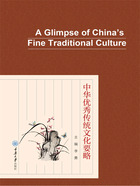
/ A Great Thinker /
As one of the greatest thinkers in the history of China, Confucius constructed a system of philosophical thought with humanity as its basic virtue, which is the central theme of The Analects of Confucius. He considered ren (仁) or humanity as the first and highest criterion of mans behavior and the core of morality. The Chinese word for humanity is composed of the character meaning “man” and the character for two, denoting vividly that which is common in two men, and suggesting the notion of a common denominator in mankind and a demarcation between man and animal. According to Confucius, humanity or benevolence means to love other men and love ones parents, brothers and sisters first. If a man of humanity wants to stand up, he should help others to stand up first; if he wants to understand things himself, he should help others to understand things first. Meanwhile, one should not impose on others what one does not desire oneself. Thus, humanity is a word embracing all those moral qualities which should govern one man in his relations with others.
Confucius stressed the importance of mans morality. He said, “To be humane is to be a man,” which means that humanity or humaneness is the fundamental quality of man, and it is this quality that makes a man a true man. As man has a moral nature, to adhere to moral principles should be everyones first consideration. Moral principles are more important than all other things including position, wealth and even life. He said, “Wealth and high position are desired by all men, but I would not have them if they were not won in the right way. Poverty and low position are hated by all men, but I would not leave them if they could not be rid of in the right way. (富与贵,是人之所欲也,不以其道得之,不处也。贫与贱,是人之所恶也,不以其道得之,不去也。)”
Humanity is the supreme moral principle or the supreme virtue. To realize it, one should, if necessary, abandon everything else including life itself. Confucius said, “A determined or humane man never give up humanity to save his life, but he may sacrifice his life to realize humanity.(志士仁人,无求生以害仁,有杀身以成仁。)”
In connection with humanity, Confucius advocated many other virtues, such as justice or righteousness (义), propriety or rites (礼), knowledge or wisdom (智), good faith or trustworthiness (信), allegiance or loyalty (忠), forbearance (恕), filial piety (孝), fraternal duty or brotherly love (悌) as well as incorruptness (廉). He called a man who had virtues a gentleman (君子) and a man who was not virtuous a petty man (小人). A man of virtue is always open and sincere, ready to help other men, free from worries and fears, and at peace with himself and the world.
The basic meaning of yi (义) is “reasonable” and “proper”. It has two extended meanings. One is the proper basis and standard for peoples actions. The other is to adjust ones words or deeds to meet certain standards, under the guidance of moral judgments.
Li refers to rituals, traditions and norms in social life. Of these, Confucius regarded burial rituals and ancestral worship rituals as the most important, because they arose from human feelings. The ritual of wearing mourning for a deceased parent for three days was an expression of the childs love and remembrance. He once said, “Do not look when your action would be contrary to rites; do not listen when your action would be contrary to rites; do not speak when your action would be contrary to rites; do not touch when your action would be contrary to rites. (非礼勿视,非礼勿听,非礼勿言,非礼勿动。)”
Confucius put emphasis on li with the aim of maintaining social order, stability and harmony.
Confuciuss views on the golden mean and harmony also had a great influence on the thinking of the Chinese people.
Zhongyong (golden mean) was considered to be the highest level of virtue by Confucius and Confucian scholars. Zhong (中) doesnt mean “compromise” but a “moderate” and “just right” way in ones words and deeds. Everything has its limits, and neither exceeding nor falling short of the limits is desirable. Yong (庸) has two meanings. One is common or ordinary and the other is unchanging. Moderation can be maintained for a long time only when one practices it in everyday life. Zhongyong means the standard of moderation that one should follow in dealing with others and in ones everyday conduct.
The Chinese term hexie (harmony) originally referred to the simultaneous combination of different tones that gave rise to a musical work. Later, it came to mean a state of governance in which there are good social relations of coexistence based on respect for difference and diversity. In such a society, all people give free rein to their talent and find their proper place to live together in harmony, order and health. Harmony is a core Confucian ethical principle for dealing with interpersonal relationships and guiding social and political activities. It now generally refers to the harmonious, peaceful, and amicable relationship between people, between groups, and between countries. Harmony represents the Chinese cultural value of opposing violence and conflicts and cherishing peace and order.